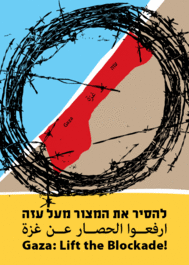-
Israel’s Disinformation Campaign Against the Gaza Freedom Flotilla
Freedom Flotilla | Witness Gaza FOR IMMEDIATE RELEASE For over four years, Israel has subjected the civilian population of Gaza to an increasingly severe blockade, resulting in a man-made humanitarian catastrophe of epic proportions. Earlier this month, John Ging, the Director of Operations of the UN Relief and Works Agency for Palestine Refugees (UNRWA) in […]
-
Tribute to the people of Gaza
Mairead Maguire, Nobel Peace Laureate 25th May, 2010 I never cease to be amazed at the power of the human spirit to survive. During my last visit to Gaza in October 2008 I was amazed and deeply moved by the power of the people I witnessed. In a triumph of hope over adversity and tremendous […]
-
IPSC: Freedom Flotilla of Aid expected to reach Gaza within 48 hours despite threats from Israeli Navy
Ireland Palestine Solidarity Campaign FOR IMMEDIATE RELEASE 27th May 2010 The Freedom Flotilla to Gaza, which includes 11 Irish people, expects to arrive at its destination within 48 hours despite Israel’s vow to block the mission from delivering much-needed aid to the beleaguered coastal strip. A forum of seven senior Israeli ministers who met on […]
Action Alert An Nabi Saleh Apartheid Wall Arrests BDS Bethlehem Bil'in Cast Lead Demonstration Denial of Entry Ethnic Cleansing Farmers Gaza Global Actions Hebron House Demolition International law Israeli Army Jerusalem Live Ammunition Nablus Ni'lin Prisoner Ramallah Rubber-coated steel bullets Settlement Settlers Settler violence Tear-Gas Canister Video

